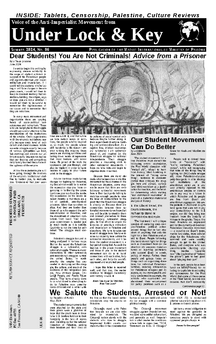
Stop Funding Prison Services
The year 2019 marks not only a new beginning, but a goal for unification for us all. As of January 2019, Governor Jerry Brown of California steps down, leaving $150 million of debt for the cost of death row, and more than 740 men and women seeking clemency. As well, the state of Georgia, which houses the largest prisoner population in segregation, looks to include another generation to their 5,000 offenders on lockdown.
In order to understand the problem of mass incarceration, and develop a solution, we first have to understand the facts from the myths. First, contrary to popular beliefs, the states actually lose money on the overall cost of prisons. States like Pennsylvania, for example, are undergoing critical budget crises in which it costs more to house you than it costs to send you to college. Almost $1 trillion annually is the cost of incarceration. So if it costs so much to house us, why not just let us go?
Second, releasing offenders from prison will not fix the debt of operating prisons, because prisons operate on a fixed scale, which doesn’t really change with the number of residents. It’s roughly $21,000 to house a prisoner, but the state doesn’t save that if you’re released.
Third, incarcerating individuals doesn’t reduce crime. Between 2010 and 2014 the total state prisoner population dropped 4%, with California contributing to 62% of the total for the country. This dropped overall crime rate by 1%. However, the now-increasing rate of incarceration has more than doubled the crime rate.
This being known, the United States still incarcerates more people per capita than any other country, at a cost of more than $50 billion. Yet there has been little decline in the total amount of people incarcerated or amount of prisons. If we hope to fix this problem, we must first create a solution. The solution is to stop the incentive of incarceration! Even though the states lose money with prisons, the employees enjoy the financial gain. Many lobbyists are proposing to close prisons, but are opening prisons? Since most debt is subsidized to the state, the prison’s main source of revenue is us! By funding the prisons we are keeping ourselves locked up. If we refuse to spend money in the prison, we can expect the prison to change.
This year marks the beginning of “Greatness Nation United” (GNU). We are the voice of the tired, the angry and defeated. I am inviting all youth to join the Greatness Movement, where we refuse to fund the prison’s commissary, prison packages, or any JPay service. If you can’t go completely without commissary, then once a month spending the lowest possible amount would impact as well. How is it possible we can sacrifice our freedom for imprisonment but won’t sacrifice “a few store goods” for your freedom? Change comes in numbers. I challenge all of you to being greater than your circumstances this year. Greater than your situation.
To everyone reading, we are greater than incarceration, only together can we achieve.
MIM(Prisons) responds: This writer sums up some important facts about the economics of incarceration. The facts about prison expenditures above can be found with background information in our article on the U.$ Prison Economy(1), published last year. And as this writer explains, releasing individual prisoners doesn’t have much of an impact on the overall cost of incarceration as long as the entire prison is being maintained. The main cost is the prison itself and the staff running it. And when prisoners are released the number of staff are not generally reduced unless the entire prison is shut down.
This comrade suggests a plan for action that will impact the prison financially. The idea of boycotting prison spending is one of the few areas where prisoners have some potential power. To spend or not to spend is discretionary. Of course the prisons can try to starve people to force them to buy supplemental food for survival. But it is still an area of power for the prisoner.
Given the $1 trillion in overall burden of prison costs, or just the $261 billion in direct criminal injustice system expenses, how much impact can prisoners have with a boycott? Have others found this effective at forcing change in the past? When we organize actions against the criminal injustice system, but it’s always good to think critically about our potential impact as we build new and better tactics in this battle.
Related Articles:








